Back in October, school leaders’ union ASCL launched a commission of inquiry into GCSE results in English. With their conference taking place this week, we are likely to hear more.
But what do we know about the group of pupils that they call the “forgotten third” – those who do not achieve at least a standard pass – grade 4 or above – in GCSE English Language?
A total of 167,000 pupils – 31.6% of all pupils from state-funded schools – did not achieve at least a grade 4 in English Language in 2017. (ASCL’s comments were based on 2018 results, though this post uses 2017 data. Broadly speaking, things won’t have changed much between the two years in ways that affect the analysis.)
Attainment in GCSE English Language
First of all, let’s look at these pupils’ attainment in GCSE English Language – shown in the chart below.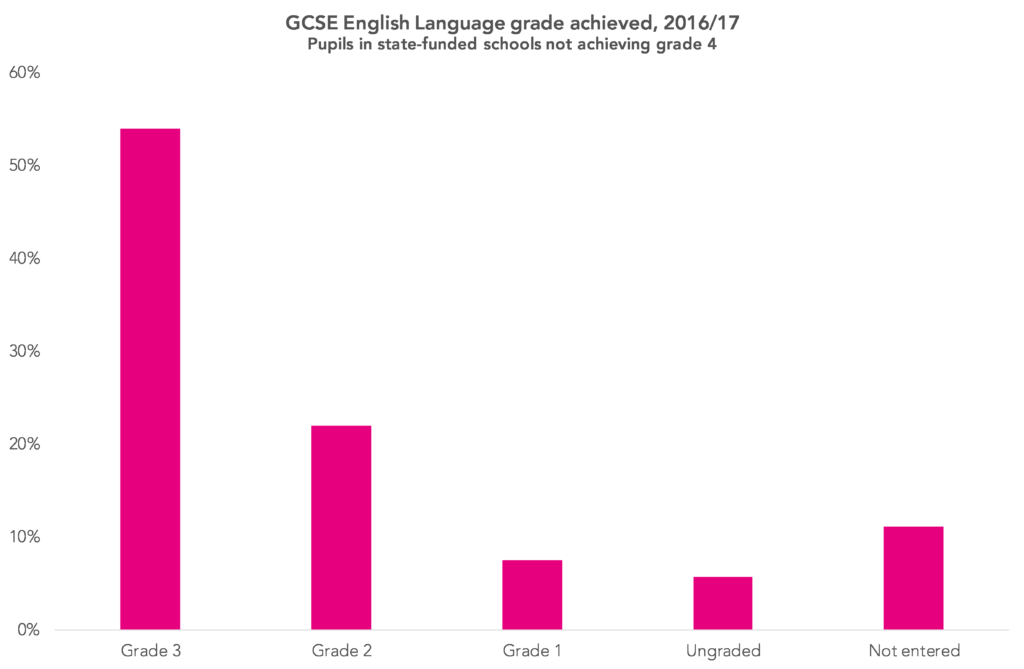
Over half of them achieved a grade 3. On the other hand, one-in-six did not receive a grade. This includes 11% who were not entered, many of which were not entered for any examinations at all for whatever reason (complex needs, illness, refusal, bereavement and so forth).
How well did they achieve in other subjects?
The chart below shows the attainment of these pupils in selected other subjects.
Almost a quarter achieved at least grade 4 in English Literature, therefore avoiding having to resit English during post-16 study. A slightly higher percentage (30%) achieved a grade 4 or above in mathematics. In total, 60% of the “forgotten third” had to resit both English and maths during their first year of post-16 study.
Nearly one-in-five (19%) achieved Level 2 – the equivalent of five or more 9-4 grades at GCSE, including non-GCSEs. This figure is based on including all qualifications approved for 16-year-olds, not just those eligible for performance tables.
This is worth noting because if we go back to 2012, prior to the changes made to performance tables following the Wolf Review, over half of pupils who achieved grade D or lower in English Language achieved Level 2.
Granted, some of those qualifications may have been over-valued in terms of their A*-C equivalence. But it demonstrates clearly that the nature of qualifications entered by lower-attaining pupils has changed over the last few years.
Progress 8
On average, pupils who did not achieve grade 4 or above in GCSE English Language achieved a Progress 8 score of -0.91. In the English bucket, it was even lower at -1.28.
The chart below shows the spread of overall Progress 8 scores of this group of pupils compared to those who achieved grade 9-4 in English Language. Almost 40% achieved a P8 score below -1, indicating that they achieved at least a grade lower per subject compared to pupils with similar prior attainment nationally.
Pupil characteristics
When it comes to pupil characteristics there are no great surprises.
Compared to those who achieved a grade 4 or higher, those who achieved a grade 3 or lower were more likely to be boys, be disadvantaged and have special educational needs. More than 40% were disadvantaged, i.e. eligible for free school meals at some point between Year 6 and Year 11.
At least 70% of the “forgotten third” spent some time on a school’s SEN register during their school career (including primary school). Though bear in mind that more pupils may have SEN than you might think.
Those achieving grade 3 or below were also slightly more likely to be summer-born and have a first language other than English.
Type of school attended
Finally, a quick look at the types of school attended by the “forgotten third”, and where they are – see the chart below.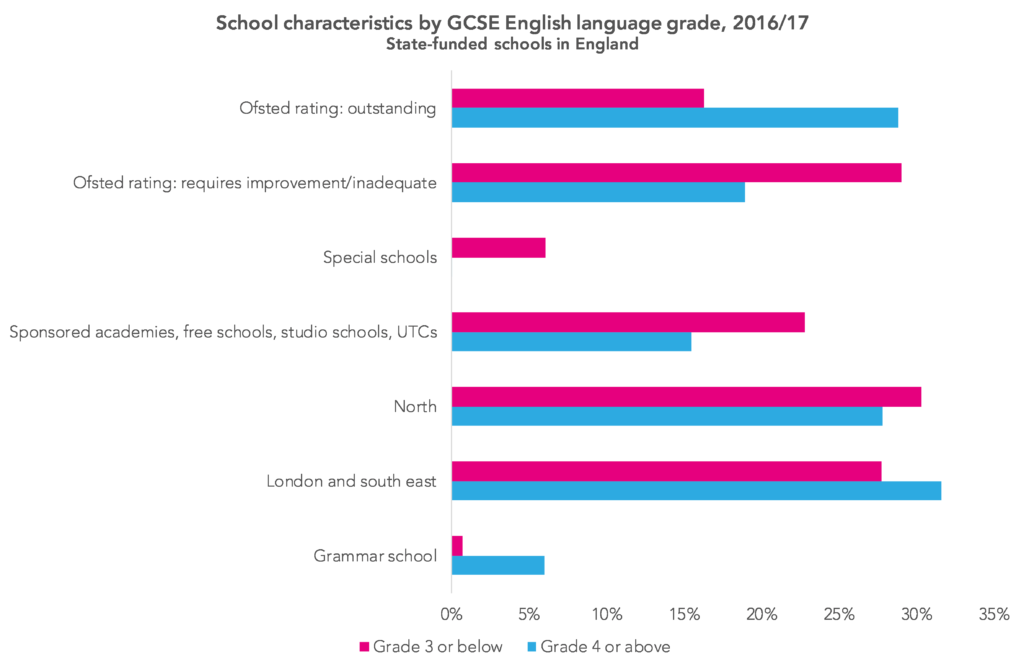
The key point here is that these pupils are not unique to one particular type of school or area. They are distributed throughout the system. Compared to those who achieve grades 9-4, they are less likely to attend outstanding schools but there are nevertheless some who do. Similarly, they are slightly less likely to attend schools in London and the south East but plenty do.
In summary
To sum up, the ASCL commission is focusing on the forgotten third of pupils who do not achieve at least grade 4 in English Language.
These pupils can be found throughout the system, in all types of schools from outstanding to inadequate, from Cumbria to Cornwall and all points east. Boys and disadvantaged pupils tend to be over-represented in this group.
Although some will achieve well in other subjects, many don’t. The spread of Progress 8 scores for the group shows that they tend to achieve less well than other pupils with similar prior (Key Stage 2) attainment. Perhaps in these cases a poor command of English language is preventing them doing well.
Want to stay up-to-date with the latest research from FFT Education Datalab? Sign up to Datalab’s mailing list to get notifications about new blogposts, or to receive the team’s half-termly newsletter.


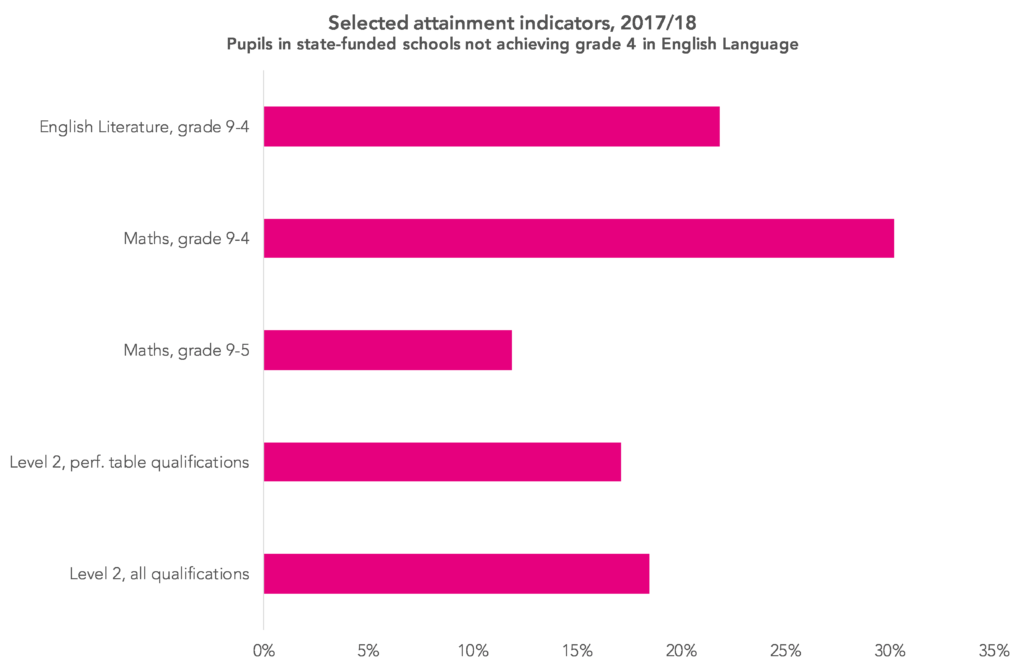

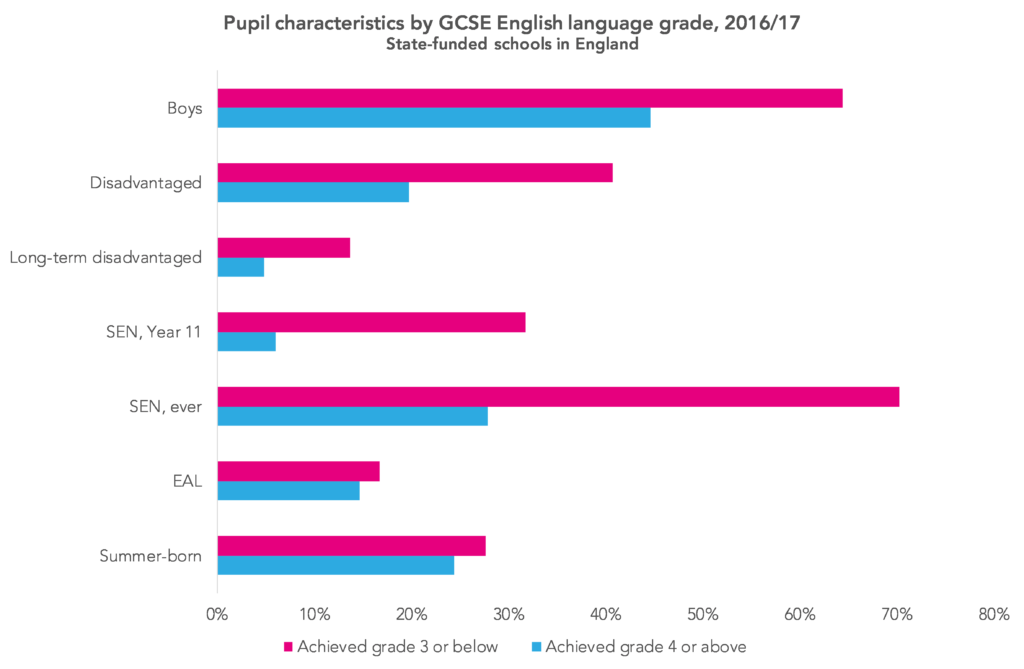
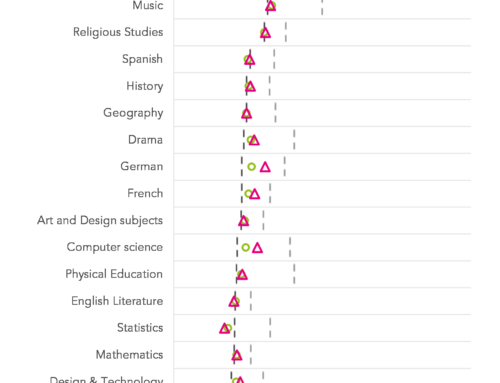
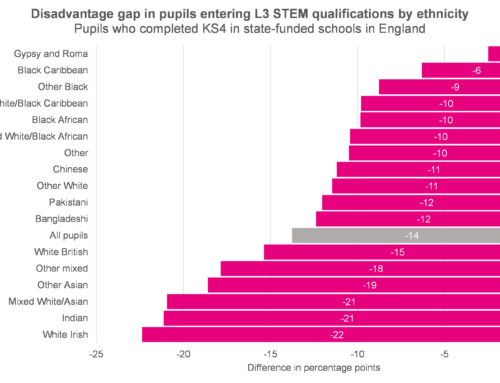
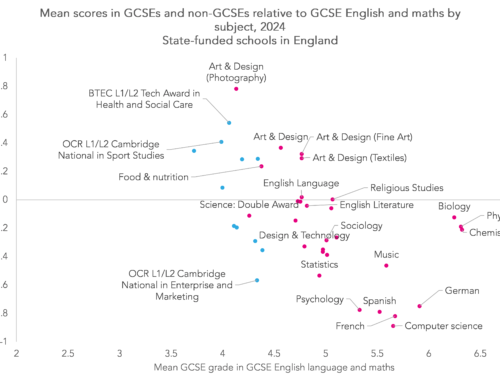
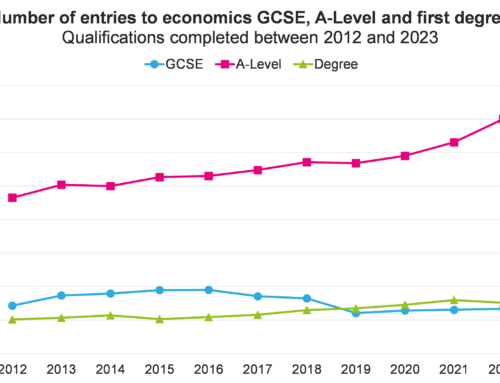

Really interesting analysis as always Dave. I suspect that overall it shows an assessment system which is proving to be an abject failure and wholly inadequate for a large proportion of pupils. It would be interesting to see a further breakdown by ethic heritage group to see how white British boys fare in this picture given that they’ve been identified as a ‘problem’ to be solved for some 15 years (probably longer) now.
Hi Paul. Thanks for commenting. On the surface the attainment of White British boys on this measure is very similar to boys from other groups. There may well be more to uncover if I dug into a bit more looking at the interaction with disadvantage etc.
Hi Dave,
Have you examined the dispersal of those pupil categories (SEND, disadvantaged, boys) within the school settings with better performance (OFSTED-rated Outstanding/Grammar Schools/Southern schools)?
I’d be interested to see whether pupil characteristics themselves lead to lower performance or lack of representation within those settings with higher results. For example, are deprived boys with SEND doing poorly in every setting?